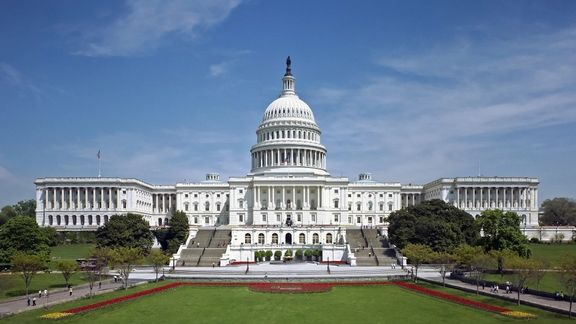US Lawmakers Back Series Of Resolutions To Support Iranians

US lawmakers have moved to hold the Islamic Republic accountable over its crackdown on dissent and possible role in chemical attacks on girls’ schools across Iran.

US lawmakers have moved to hold the Islamic Republic accountable over its crackdown on dissent and possible role in chemical attacks on girls’ schools across Iran.
A group of nearly 20 Republican and Democratic members of the US House has formed the Iranian Women Congressional Caucus, condemning the Iranian government over the recent poisoning of schoolgirls.
Amplifying the growing criticism in Washington against the Islamic Republic and its disregard for human rights, Rep. Sheila Jackson Lee (D-TX) and Rep. Nancy Mace (R-SC) -- who cochair the caucus – said Thursday that they are working on a resolution that condemns the Iranian government over the recent poisoning of schoolgirls.
The resolution, already backed by over a dozen lawmakers from both parties, calls on the State Department and the UN to investigate the attacks.
“So many Iranian women are showing their bravery and resiliency in the face of challenges in their fight for equality and human rights. We will be on the side of freedom and oppose the oppression of women, in the United States, Iran, and around the globe,” said founding co-chair Mace.
The caucus is the latest move by US lawmakers to denounce the treatment of women in Iran, especially since the death of 22-year-old Mahsa Amini in custody of hijab police in September 2022, which led to the boldest revolt against the clerical regime since its establishment in 1979.
More than 500 people have been killed in the nationwide rallies, nearly 20,000 have been detained, and several were executed on trumped up charges.
Moreover, a series of suspected chemical attacks at girls’ schools began in November and sending hundreds of schoolgirls to hospital, fueling claims about the violation of women’s and girls’ rights and prompting demonstrations in protest to the regime’s inaction and possible involvement.
In January, the House overwhelmingly approved a resolution expressing solidarity with the protesters. The 420-1 vote voiced support for the people in Iran who have been risking imprisonment and even death to protest against the country’s theocracy, which has engaged in a brutal crackdown of its citizenry.
Advocates and human rights groups have called on the US and other Western democracies to cut ties with the Islamic Republic and impose harsher sanctions on the top officials, including Supreme Leader Ali Khamenei and President Ebrahim Raisi.
The House Foreign Affairs Committee has finally scheduled the Mahsa Amini Human rights and Security Accountability Act -- or the MAHSA Act -- for a markup on April 26.
Late in January, House Armed Services Committee Member Rep. Jim Banks (R-IN) introduced the bipartisan MAHSA Act to sanction Iran’s ruler and his inner circle, saying “Regular Iranians like Mahsa Amini are being murdered and persecuted by the Iranian regime, but the Biden administration is still trying to cozy up to Iran’s senior officials so he can cut an even more disastrous nuclear deal.”
The markup session will be held by efforts of members of the Iranian-American community as well as more than 80 Democrat and Republican co-sponsors of the Act and Representative Michael McCaul (R-TX), the chairman of the committee.
The National Union for Democracy in Iran (NUFDI) announced in January that “NUFDI as a grassroots Iranian-American organization, is proud to support the re-introduction of the MAHSA Act in the 118th Congress,” urging “all members of Congress, regardless of their political affiliation, to support the MAHSA Act.”
Another advocacy group United Against a Nuclear Iran said, "The MAHSA Act provides a critical pillar in holding Iran's regime accountable for its crimes against the Iranian people and the international community. The supreme leader has evaded US counterterrorism and human rights abuse sanctions for years.”
However, some lobbyists and a few lawmakers try to dilute the act, describing it as “Islamophobic” or “not leading to any increased sanctions.”
NIAC, advocating non-confrontational policies toward the Islamic Republic, said in a statement that “the bill would make it more difficult for a President to lift sanctions on these officials as part of any diplomatic agreement... This bill does not include a sunset and would target the offices themselves, rather than individuals. As a result, it would remain in effect indefinitely and be applied to any future Supreme Leader or President of Iran until its repeal."
Tweet unavailable